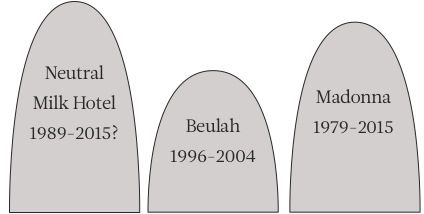Better off dead?: The heartbreak of finding a band past its expiration date

March 18, 2015
Last March, the ’90s indie rock pioneers Neutral Milk Hotel came to Pittsburgh for the last time in the foreseeable future. It was part of a massive farewell tour that won’t end until June. As was the case in Pittsburgh, the tour gives the fans, most of whom are in their early-to-mid thirties now, a chance to see the legendary group one final time before they might fade to complete obscurity forever.
I didn’t have emotional nostalgia swooning in my heart at the show, as many around me seemed to, but that show has since become important to me for another reason. During my three-to-four days of post-concert binge consumption of Neutral Milk Hotel and other music from its avant-garde label, The Elephant 6 Recording Company, I discovered a band that has rarely stopped playing in my head. Unfortunately, in real life, the band stopped playing years ago — and it likely won’t reenter the touring circuit.
Beulah — who only released one of its four records on Elephant 6 — is the band. A modern reincarnation of The Beach Boys caught up in prevalent indie rock motifs — like self-consciousness and applying dull parties as metaphor for growing older — the San Francisco indie-pop rockers have held my affection with songs like the playful yet unmistakably determined “If We Can Land A Man On The Moon, Surely I Can Win Your Heart.”
Discovering a new favorite band is like entering into a new relationship — you want to spend all your time with them, even when doing monotonous things like homework. Listening to their albums is euphoric, and each song seems perfectly agreeable to your tastes — so much so that you wonder what you’ve even been listening to the last few years before they stepped into your life.
Naturally, as I did after a few listens, you want to get serious and see your new love face-to-face. Those just finding Neutral Milk Hotel, for example, know this sense of urgency. The Internet has made doing so mindlessly easy, as bands keep their devoted fans updated through Facebook and email lists, alerting the fan base when they will be coming to a venue near them.
But now, likely as the mutual friend who introduced you to your lover, the Internet has also grown into the bearer of bad news — a cemetery, littered with the abandoned cybergravestones of deceased bands, engraved with long-past tour dates and defunct merchandise links with “sold out” printed over the images.
One of these graves belongs to Beulah, which broke up tragically young in 2004 — around the age of eight — despite budding commercial success. For instance, Fox’s “The O.C.” featured the Beulah song “Popular Mechanics for Lovers” in the second volume of its critically acclaimed soundtrack.
“What I write about isn’t so much mortality,” singer and guitarist Miles Kurosky said to Rolling Stone in 2003, prior to the release of Beulah’s fourth and final record Yoko, “but the mortality of being in a band: How long can this last? Here I am in an indie rock band that’s done quite well … but at the end of the day I wonder what I’ve done. All I got is some crow’s feet. What’s the f*cking prize?”
The prize is neither tangible nor quantifiable. It is not measured in album sales or Spotify plays, and it probably comes years after it’s most desired in the form of praise from underground online fanzines and lists of great overlooked albums of the 2000s. As the influence of major figures like Neutral Milk Hotel continues to grow retrospectively, the Internet will similarly bring curious young fans Beulah’s way, where they too will be disappointed when redirected to the band’s cybergrave. That’s the prize.
Kurosky’s disillusionment with Beulah’s mild success reflects a larger problem in indie rock, where the genre has become flooded with acts achieving varying levels of success and some eclipse many others who arguably deserve success more. The singer and guitarist’s disappointment also, most importantly, mirrors the disappointment of the young listener who discovers the band too late — which, in the Internet age, is as close as it gets to laying flowers on a dead band’s grave and whispering “rest in peace” as the deceased’s songs loop on repeat in their headphones.


